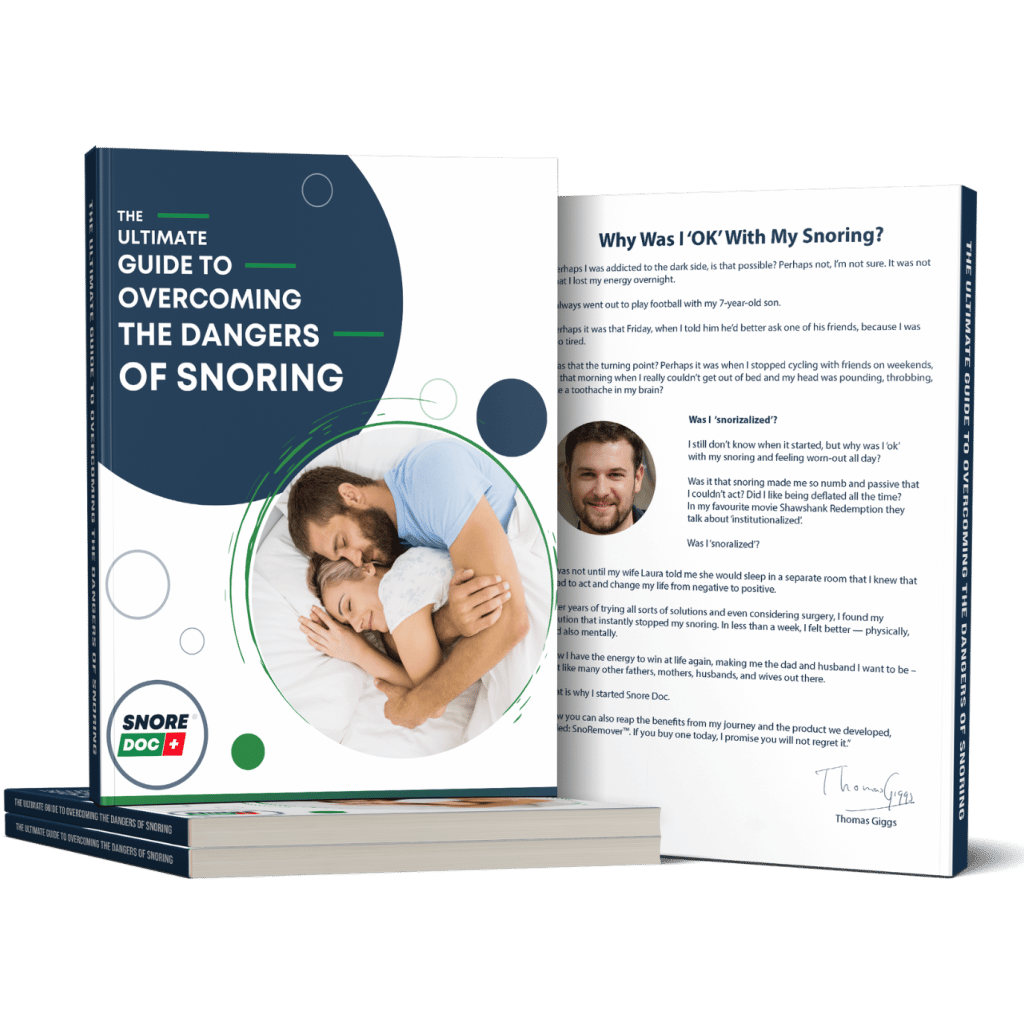If you’ve ever been woken up by an angry person throwing pillows at you, there’s a very good chance that you’re a snorer!
That also applies if you’ve ever been suddenly disturbed by the sound of swine in your bedroom, because, as you’ve probably already worked out – that farmyard noise is you!
Now, snoring is nothing to worry about for the most part, apart from the danger coming from a tired and irritable spouse, however, it can sometimes be an indicator of more serious health conditions (Columbia University Department of Neurology). Your airways can become partially blocked for a multitude of reasons, resulting in those telltale involuntary pig noises.
The fact is that almost 50% of all adults snore in some way or other, so it’s something that literally affects billions of people around the world. Exacerbated by other factors like age, weight and sleeping position, snoring will have affected all of us in some way during our lives.
What the Snoring Boffins Say
The people with big brains, white coats and clipboards tell us that there are 4 main types of snoring (News Medical) that occur, with each type having its own set of causes. So, whether you snore like Big Bird from Sesame Street or like a chainsaw working its way through a log, there’s a science behind it that will help you understand why it’s happening and how to stop it.
Let’s have a little look at each one…
Download our free anti-snoring guide

Type #1 - Nasal Snoring
As the name suggests, the first type of snoring involves an obstruction in the nasal passages that can happen for a number of reasons. From mancolds to allergies to more serious causes like a deviated septum, nasal snoring results when you try and squeeze all the necessary oxygen past whatever obstruction exists up your nose.
For the most part, a trip to the pharmacy will sort the problem out, as antihistamines can be very effective at minimising the symptoms of the most common causes – hay fever and dust. Usually temporary, nasal snoring is relatively easy to deal with, but no less annoying for those you live with.
Type #2 - Oral Snoring
If you’re mouth-breathing because of a blocked nose or weak tissue in your palate, you’re likely to be in the medium range of snoring noise. Particularly harmful to children, oral snoring, one of the main types of snoring, can result in a deformed palate that can even change the way their face looks.
In terms of seriousness, this is at the upper end of the scale, as it can lead to serious complications like sleep apnea, chronic snoring and airway collapse in the most severe cases. Here, it’s the soft palate that’s to blame and the resultant disruption to sleep can have a major impact on the mental health, cognitive abilities and overall quality of life of the sufferer.
Whilst at first glance oral snoring looks like a fairly benign issue, it can have a huge effect on the person it’s happening to and as such, needs attention.
Type #3 - Tongue Snoring
Next up we have tongue snoring which happens when your tongue muscle becomes excessively relaxed – usually when you lie on your back. This blocks airflow to the lungs, making it difficult to breath and creates snoring vibrations as a consequence. This often happens as a result of the tongue becoming over-relaxed because of imbibing alcohol or other relaxants like sleeping tablets.
A solution sleep doctors tend to recommend to tongue snoring is wearing snoring mouthpieces or mandibular advancement devices like SnoRemover™ to move the jaw forward, preventing the tongue from retracting backward.
Type #4 - Throat Snoring
Lastly, we look at easily the loudest and potentially most dangerous type of snoring. Sleep apnea – which involves worryingly long periods of not breathing – is the main cause of throat snoring and often leads to the sufferer waking themselves up numerous times during the night (National Health Service (NHS)).
Resulting in the sufferer pausing their breathing for upwards of 10 seconds at a time, sleep apnea falls into two main categories:
• Obstructive sleep apnea
• Central sleep apnea
Obstructive sleep apnea is much more common and happens when the muscles around the larynx have trouble keeping the airways open. Conversely, central sleep apnea is caused when the brain is unable to control normal breathing. According to the National Sleep Foundation, over 18 million people in the US alone suffer with sleep apnea.
Typically, sleep apnea treatment involves identifying the underlying cause and addressing with treatment and preventative measures and in some cases, the provision of oxygen therapy. Age, weight, family history and smoking are all amongst the leading causes of the condition.
Really Listen to What Your Snoring is Telling You
Whilst snoring is extremely common and it’s not serious in most cases, it does affect those around you and it can reflect more serious ailments. If you use the information we’ve shown you here and you really listen to what your snoring is telling you, you get a much clearer view of how to come up with a solid management plan. Perhaps get your partner to record your snoring and look at the associated symptoms, as you can find clues as to what you can do about it.
We hope this article has helped you better understand the diversity of snoring sounds and just how many underlying reasons there could be for it happening.
If you would have any questions about snoring or there is something you’d like to add, please don’t hesitate to contact us.


